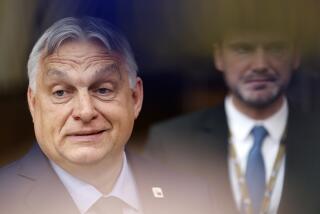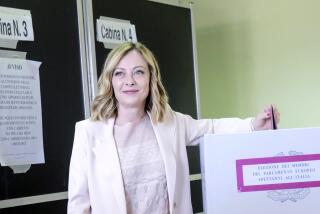Prague Leader Sees Need to Swiftly Establish Democratic Structures : Czechoslovakia: Havel does not explain the reasons for his unease. But there is concern that Soviet events may spin out of Gorbachev’s control.
- Share via
PRAGUE, Czechoslovakia — A growing sense of urgency over putting democratic structures in place emerged here Friday, apparently spurred by concern that events in the Soviet Union may spin out of President Mikhail S. Gorbachev’s control.
“All the information I have, and also my instincts, tell me that the times are such that we must work quickly,” President Vaclav Havel told the Slovak National Council in Bratislava.
Havel, who headed the democratic movement Civic Forum until taking over the presidency last month, did not explain the reasons for his unease.
But Jan Urban, another member of Civic Forum’s inner council, said that “from a political point of view, people think that because of developments in the Soviet Union, we should have (free elections) as soon as possible.”
Urban told an interviewer that the movement is strong enough to cope with any attempted comeback by the Czechoslovak Communist Party but that “we would have real problems with strong Soviet pressure without an elected Parliament.”
The concern is that a combination of economic problems and ethnic unrest in some of the Soviet republics could threaten Gorbachev’s hold on power and the integrity of the Soviet Union itself.
Such a crisis might tempt Gorbachev to crack down, or face being ousted in favor of a tougher leadership, with unforeseeable impact on the Kremlin’s policy toward Czechoslovakia and the other East European nations that broke with the Kremlin last year.
A well-placed Czechoslovak Communist Party source said in a separate interview Friday that several influential Soviet visitors have recently expressed concern that Czechoslovakia’s revolution has gone too far.
A Communist heads the interim, coalition government of Czechoslovakia that was installed in December, but Havel and Civic Forum wield the real political power.
“Practically, the government is without Communists,” said the party source, who is a leader of the reformist faction known as the Democratic Forum of Communists. “From the point of view of power at the top, we are now with the West, which is not true even in Hungary or Poland.”
The Soviets, after failing to support the reformers while there may still have been a chance to save the Czechoslovak party, are now “becoming more active” here, this source said.
The Democratic Forum of Communists was given space for a meeting this week in Prague’s Soviet House of Culture. Moscow has even offered financial help to the faction, apparently to match Western support given to some of Czechoslovakia’s new parties, the source said.
A Civic Forum spokesman said Friday at a press conference that Civic Forum, the Communists and other political forces in Czechoslovakia have given tentative approval to June 8 as the date for Czechoslovakia’s first free elections in more than 40 years.
Petr Pethardt, a member of the movement’s three-man coordinating center, said the agreement was reached in the so-called round-table talks attended by Communist and opposition factions. Also, he said, it was agreed to restructure the Parliament by the end of the month to deprive the Communist Party of its majority before the lawmakers take up pre-election legislative proposals.
The party has agreed to recall as many as 100 deputies and retain less than half of the 400 seats in the Federal Assembly, Pethardt said. New deputies will be named by Civic Forum and its sister movement in the Slovak republic, Public Against Violence.
It will be the second such parliamentary overhaul since the Civic Forum-led uprising that overthrew the Communists’ one-party rule last month. Three weeks ago, 28 discredited Communists were forced to resign from Parliament, and their seats were taken by the opposition.
One of those seats went to Alexander Dubcek, the former Communist leader whose “Prague Spring” reforms of 1968 were crushed by a Soviet-led invasion. Dubcek, who spent 20 years in political exile, has been chairman of the Federal Assembly since last Dec. 28.
Civic Forum wants to reorganize Parliament under the proposed electoral laws, Pethardt told the press. Otherwise, he said, “everybody is looking for new people to fit in old, wrong positions.”
He said that “technical” objections were raised by other round-table participants and that the issue remains open.
“With the exception of a few minor details, final agreement was reached” on election procedures, he said. They are complicated, he said, but appear to be in line with Civic Forum’s proposals.
The movement has proposed “very sensitive” restrictions meant to eliminate from the new Parliament the smallest of the 36 or so new political parties.
For example, a party would qualify for the ballot only if it could prove to have at least 10,000 supporters, and it would need at least 5% of the vote in the Czech or the Slovak republics to be represented in Parliament.
More to Read
Sign up for Essential California
The most important California stories and recommendations in your inbox every morning.
You may occasionally receive promotional content from the Los Angeles Times.













